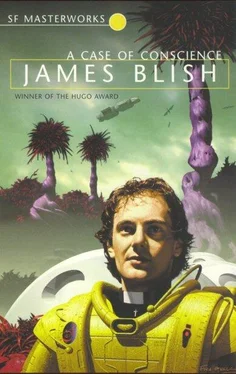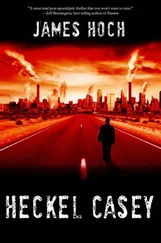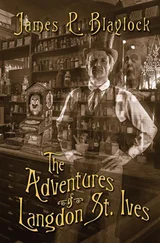The residuum was faith.
The high, sharply vaulted chamber, like an egg stood on its large end, which had been burned out in the base of the Message Tree, was droning with life as Ruiz-Sanchez entered it. It would have been difficult to imagine anything less like an Earthly telegraph office or other message center, however.
Around the circumference of the lower end of the egg there was a continual whirling of tall figures, Lithians, entering and leaving through the many doorless entrances, and changing places in the swirl of movement like so many electrons passing from orbit to orbit. Despite their numbers, their voices were pitched so low that Ruiz-Sanchez could hear, blended in with their murmuring, the soughing of the wind through the enormous branches far above.
The inner side of this band of moving figures was bounded by a high railing of black, polished wood, evidently cut from the phloem of the Tree itself. On the other side of this token division, which reminded Ruiz-Sanchez irresistibly of the Encke division in the Saturnian rings, a thin circlet of Lithians took and passed out messages steadily and without a moment’s break, handling the total load faultlessly-if one were to judge by the way the outer band was kept in motion-and without apparent effort, by memory alone. Occasionally one of these specialists would leave the circlet and go to one of the desks which were scattered over most of the rest of the sloping floor, increasingly thinly, like a Crape ring, to confer there with the desk’s occupant. Then he went back to the black rail, or sometimes he took the desk, and its previous occupant went to the rail.
The bowl deepened, the desks thinned, and at the very center stood a single, aged Lithian, his hands clapped to the ear whorls behind his heavy jaws, his eyes covered by their nictitating membranes, only his nasal fossae and heat-receptive post-nasal pits uncovered. He spoke to no one, and no one consulted him-but the absolute stasis in which he stood was obviously the reason, the sole reason, for the torrents and counter-torrents of people which poured along the outermost ring. Ruiz-Sanchez stopped, astonished. He had never been to the Message Tree himself before-communicating with Michelis and Agronski, the other two Earthmen on Lithia, had until now been one of Cleaver’s tasks-and the priest found that he had no idea what to do. The scene before him was more suggestive of a bourse than of a message center in any ordinary sense. It seemed unlikely that so many Lithians could have urgent personal messages to send each time the winds were active; yet it seemed equally uncharacteristic that the Lithians, with their stable, abundance-based economy, should have any equivalent for stock or commodity brokerage.
There seemed to be no choice, however, but to plunge in, try to reach the polished black rail, and ask one of the Lithians who stood on the other side to try to raise Agronski or Michelis again. At worst, he supposed, he could only be refused, or fail to get a hearing at all. He took a deep breath.
Simultaneously his left arm was caught in a firm four-fingered grip which ran all the way from his elbow to his shoulder. Letting the stored breath out again in a snort of surprise, the priest looked around and up at the solicitously bent head of a Lithian. Under the long, trap-like mouth, the being’s wattles were a delicate, curious aquamarine, in contrast to its vestigial comb, which was a permanent and silvery sapphire, shot through with veins of fuchsia.
“You are Ruiz-Sanchez,” the Lithian said in his own language.
The priest’s name, unlike those of the other Earthmen, fell easily in that tongue: “I know you by your robe.”
That was pure accident. Any Earthman out in the rain in a mackintosh would have been identified as Ruiz-Sanchez, because the priest was the only Earthman who seemed to the Lithians to wear the same garment indoors and out.
“I am,” Ruiz-Sanchez said, a little apprehensively.
“I am Chtexa, the metallurgist, who consulted with you earlier on problems of chemistry and medicine and your mission here, and some other smaller matters.”
“Oh. Yes, of course; I should have remembered your comb.”
“You do me honor. We have not seen you here before. Do you wish to talk with the Tree?”
“I do,” Ruiz-Sanchez said gratefully. “It is true that I am new here. Can you explain to me what to do?”
“Yes, but not to any profit,” Chtexa said, tilting his head so that his completely inky pupils shone down into Ruiz-Sanchez’ eyes. “One must have observed the ritual, which is very complex, until it is habit. We have grown up with it, but I think you lack the coordination to follow it on the first attempt. If I may bear your message instead-”
“I would be most indebted. It is for our colleagues Agronski and Michelis; they are at Xoredeshch Gton on the northeast continent, at about thirty-two degrees east, thirty-two degrees north-”
“Yes, the second bench mark at the outlet of the Lesser Lakes; that is the city of the potters, I know it well. And you would say?”
“That they are to join us now, here, at Xoredeshch Sfath. And that our time on Lithia is almost up.”
“That me regards,” Chtexa said. “But I will bear it.”
The Lithian leapt into the whirling cloud, and Ruiz-Sanchez was left behind, considering again his thankfulness that he had been moved to study the painfully difficult Lithian language. Two of the four commission members had shown a regrettable lack of interest in that world-wide tongue: “Let ’em learn English” had been Cleaver’s unknowingly classic formulation. Ruiz-Sanchez had been all the less likely to view this notion sympathetically for the facts that his own native language was Spanish, and that, of the five foreign languages in which he was really fluent, the one he liked best was West High German.
Agronski had taken a slightly more sophisticated stand. It was not, he said, that Lithian was too difficult to pronounce-certainly it wasn’t any harder on the soft palate than Arabic or Russian-but, after all, “it’s hopeless to attempt to grasp the concepts that lie behind a really alien language, isn’t it? At least in the time we have to spend here?”
To both views, Michelis had said nothing; he had simply set out to learn to read the language first, and if he found his way from there into speaking it, he would not be surprised and neither would his confreres. That was Michelis’ way of doing things, thorough and untheoretical at the same time. As for the other two approaches, Ruiz-Sanchez thought privately that it was close to criminal to allow any contact man for a new planet ever to leave Earth with such parochial notions. In understanding a new culture, language is of the essence; if one doesn’t start there, where under God does one start?
Of Cleaver’s penchant for referring to the Lithians themselves as “the Snakes,” Ruiz-Sanchez’ opinion was of a color admissible only to his remote confessor.
And in view of what lay before him now in this egg-shaped hollow, what was Ruiz-Sanchez to think of Cleaver’s conduct as communications officer for the commission? Surely he could never have transmitted or received a single message through the Tree, as he had claimed to have done. Probably he had never been closer to the Tree than Ruiz-Sanchez was now.
Of course, it went without saying that he had been in contact with Agronski and Michelis by some method, but that method had evidently been something private-a transmitter concealed in his luggage, or… No, that wouldn’t do. Physicist though he most definitely was not, Ruiz-Sanchez rejected that solution on the spot; he had some idea of the practical difficulties of operating a ham radio on a world like Lithia, swamped as that world was on all wave-lengths by the tremendous pulses which the Tree wrung from the buried crystalline cliff. The problem was beginning to make him feel decidedly uncomfortable.
Читать дальше











